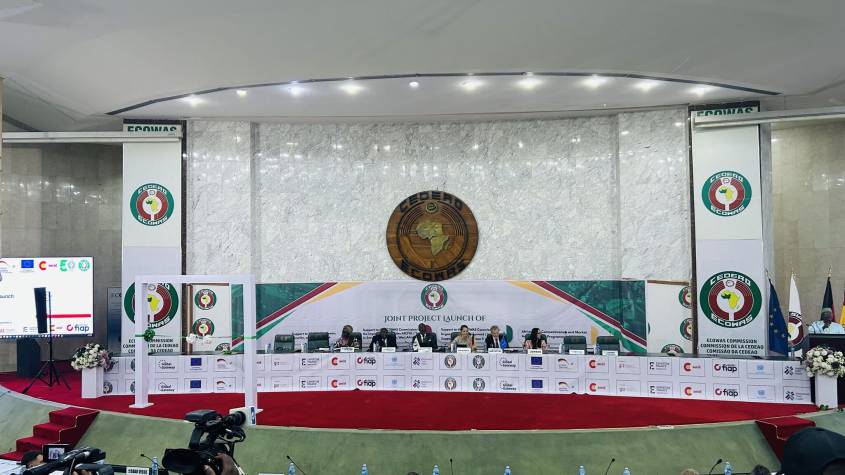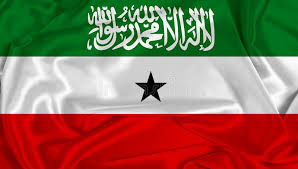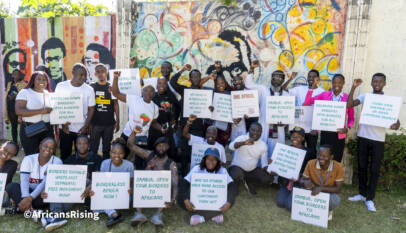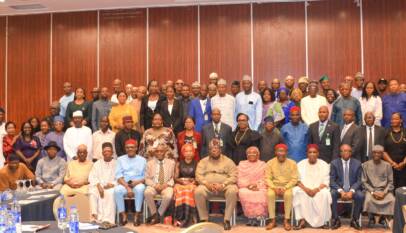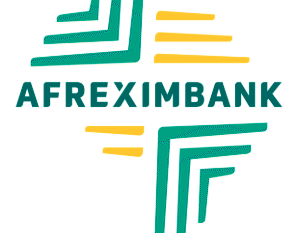Day ECOWAS, EU Unveiled 4 Projects Advancing Peace and Trade in West Africa
The Economic Community of West African States (ECOWAS) Commission, in collaboration with the European Union (EU), Germany, and Spain, has launched four regional programs valued at €110 million, aimed at strengthening peace, security, and trade in West Africa.
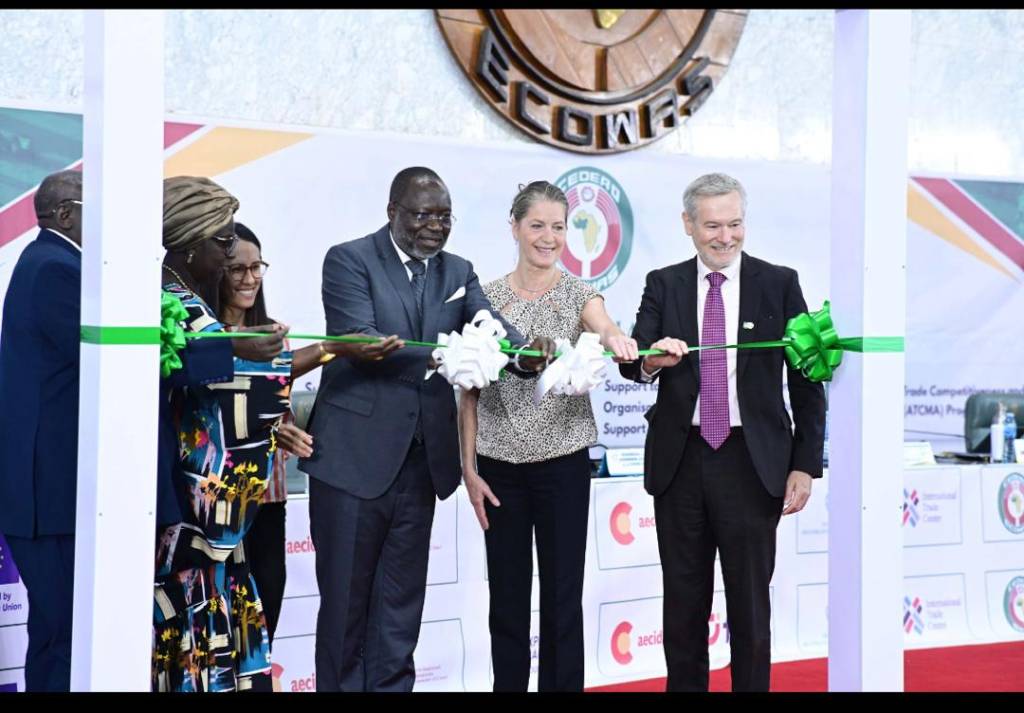
The landmark launch, held last week Tuesday in Abuja, brought together high-ranking ECOWAS officials, European Union representatives, and multilateral agencies. ECOWAS President Dr. Omar Alieu Touray described the event as “a new phase in our collaboration to drive real change across the region.”
The four projects launched included the Support to ECOWAS in Peace, Security and Governance (EPSG) project funded by the EU and the German Federal Ministry for Economic Cooperation and Development (BMZ). EPSG provides technical and financial support to ECOWAS for the strengthening of regional peace, security, and democratic governance. Likewise, the Support to ECOWAS Commission in the Implementation of the AfCFTA will strengthen ECOWAS’s capacity to implement the AfCFTA, particularly trade in services.
Moreover, the Africa Trade Competitiveness and Market Access (ATCMA) program aims to boost trade competitiveness and market access across West Africa, integrate West African economies into continental and global value chains in alignment with the AfCFTA. Additionally, the Support to the ECOWAS Commission on Organisational Development (OD II) program is designed to strengthen the institutional capacity of the ECOWAS Commission to effectively implement its regional integration and development mandate.
These initiatives align with ECOWAS’s long-term development agenda aimed at creating a peaceful, prosperous, and integrated West Africa by 2050. The ECOWAS Vision 2050 builds on the progress of its Vision 2020 and emphasizes a shift from an “ECOWAS of States” to an “ECOWAS of Peoples.” Likewise, the programs align with the EU’s Global Gateway strategy, which seeks to promote smart, clean, and secure infrastructure across digital, energy, and transport sectors, while also strengthening health, education, and research systems globally.
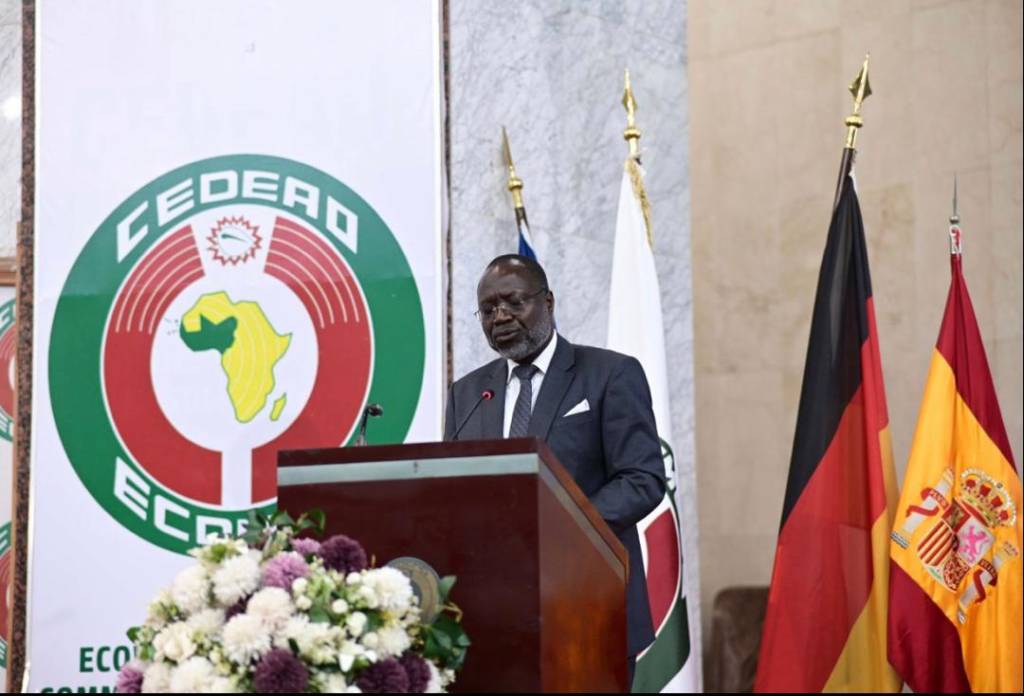
“West Africa’s 400mm People’ll Continue to enjoy Free Mobility, Trade” – ECOWAS President
In his remarks at the launch ceremony, Dr Omar Alieu Touray, President of the ECOWAS Commission, emphasized the strategic significance of the newly launched projects to regional development, governance, and stability. He noted that the collective value of the projects amounted to €110 million, with €82.5 million provided by the European Union, €26 million by Germany, and €1 million by Spain.
“The budget of these projects amounts to about €110 million with about a million euros coming from Spain, and the rest is financed by the EU and Germany on a fifty-fifty basis. We are grateful to these partners for their continued support, not only at regional level, but also at individual country levels. We are equally appreciative of the support coming from other members of the European Union who are not involved in these four projects,” he said.
Touray said the 4 projects are all aligned with the region’s core priorities under the ECOWAS Vision 2050, and critical to strengthening peace, democratic governance, and the promotion of intra-African trade, particularly operationalizing the AfCFTA. In addition, he said the projects will help strengthen the effectiveness and efficiency of the ECOWAS Commission and other regional institutions to improve transparency, financial governance and program delivery.
Veering off-script, Dr Touray appealed for a results-oriented approach in the projects’ implementation. “Let us focus on delivering to the people. Let us focus on concrete results on the ground. Let us reduce workshops, trainings and validation activities. I think we need to focus on delivery on the ground, delivery to our people. The challenge we are facing as a region and as partners can be addressed if our people feel the impact of our collaboration.”
While speaking on ECOWAS’s recent diplomatic engagement with its 3 erstwhile members i.e. Mali, Niger and Burkina Faso; the ECOWAS chief said they had reached an agreement with the three countries to maintain the status quo in terms trade, free movement, and collaboration on peace and security until new terms are reached. “And we will also continue to explore avenues of collaboration in the area of peace and security. The 400 million people of West Africa will continue to enjoy the benefits of free movement and free trade,” he assured.
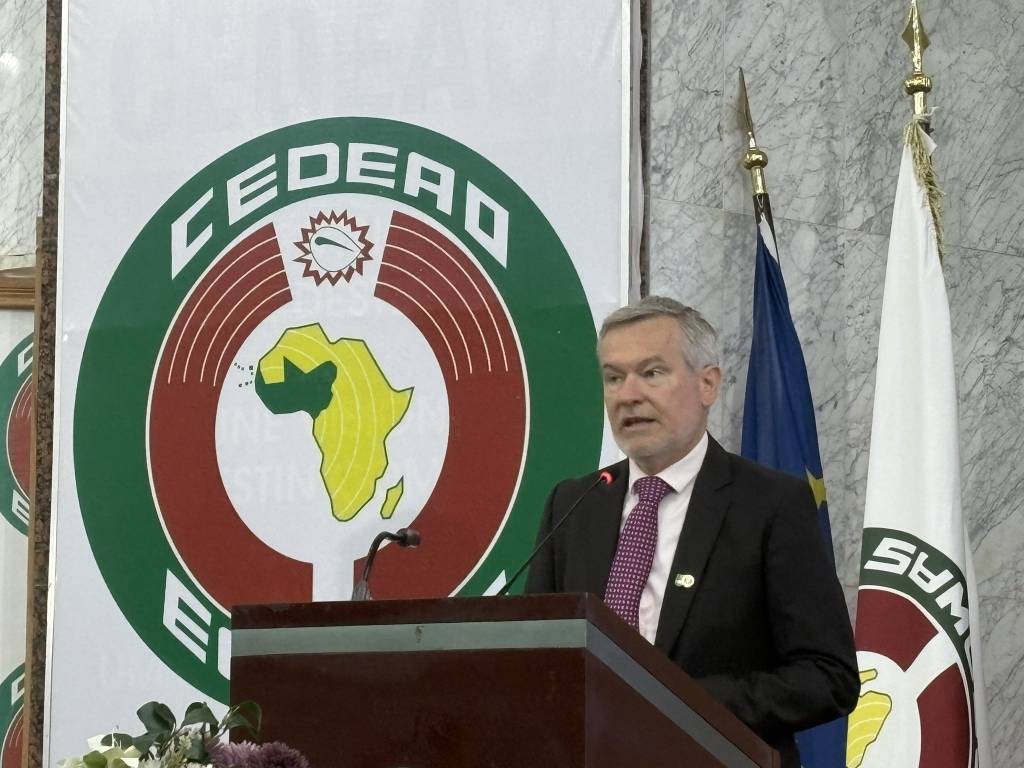
“EU Supportive of ECOWAS Vision of Integrated, Prosperous West Africa” – EU Envoy
In his remarks, Amb Gautier Mignot, Ambassador of the European Union to Nigeria and ECOWAS, reiterated the EU’s strategic commitment to supporting ECOWAS’ transformation agenda, noting that the four projects jointly funded by the EU, Germany and Spain illustrate the Team Europe unified approach of promoting stability, integration and prosperity across West Africa in alignment with ECOWAS’ long-term vision.
“These programs reflect the strength and depth of the partnership between the European Union and its Member States on the one hand and ECOWAS and its Member States on the other hand. Notably they come at the time of the ECOWAS fiftieth anniversary underlying the long-standing relationship between the EU and ECOWAS. We all know there can be no sustainable development without security, no effective trade without effective institutions, and no peace without inclusive economic growth,” he said
Amb. Mignot said the EU is proud to support this vision and the ECOWAS’s efforts in building a safer, more integrated and more prosperous West Africa. He added that the newly launched projects also support the private sector, enhance cross-border trade, and improve ECOWAS’s institutional governance necessary to address both urgent regional crises and long-term structural development. He affirmed the EU’s belief in regional responses to regional challenges and praised ECOWAS for working toward becoming an “ECOWAS of the People.”
“This event today comes at a defining moment for ECOWAS, a turning point and it expresses our firm belief in the community’s relevance and bright future as a beacon of democracy, stability, prosperity and sustainable development. Together, let us turn these investments into lasting impact,” he concluded.
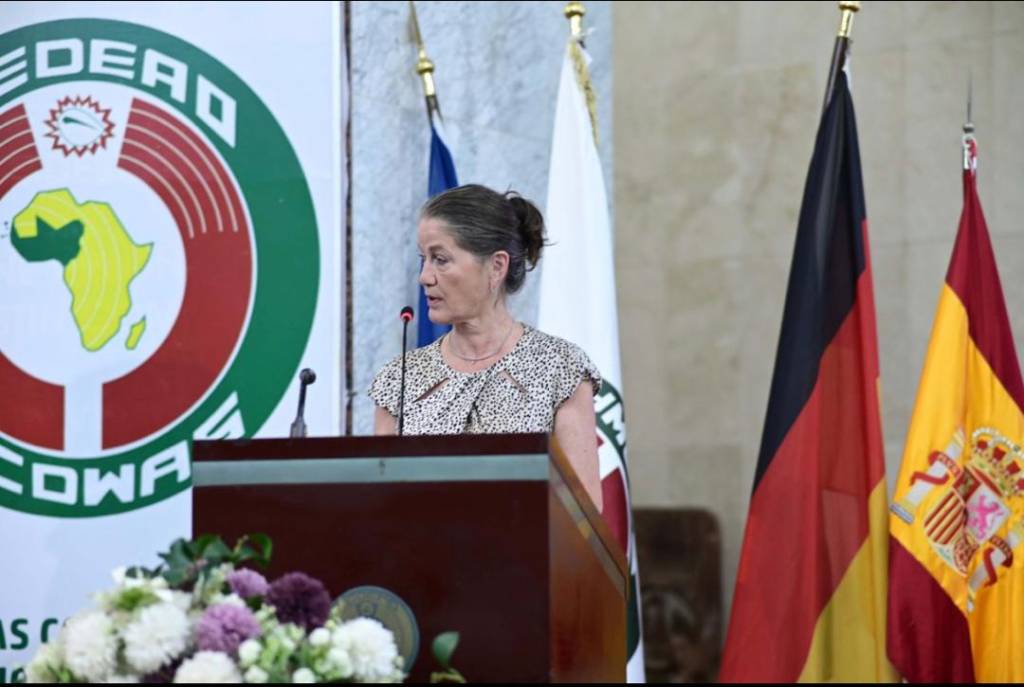
“Germany Committed to a Stable, Prosperous West Africa” – Envoy
In her remarks, Ms Annett Günther, the German Ambassador to Nigeria, said the joint projects launch is a reaffirmation of Europe’s long-standing and shared commitment to trade, peace and security, and good governance in West Africa. “It builds on a history of successful cooperation. Over the past twenty years, Germany has continuously supported ECOWAS and its Member States in this process and we believe that regional integration promotes economic development, political stability, inclusive societies, and environmental protection, amongst other things.”
Amb. Gunther said Germany’s support includes enhancing the ECOWAS Commission’s internal structures through the Organizational Development (OD) program, which prepares ECOWAS for EU pillar certification, a move expected to unlock increased access to funding for the regional block. “Our project supports ECOWAS in peace, security, and governance; responding to the region’s complex security and governance challenges– from early warning and mediation to electoral support and inclusive peacebuilding.”
The German Envoy emphasized the importance of liberalizing service sectors like ICT, transport and finance under the AfCFTA and reiterated Germany’s commitment to deepening collaboration at national, regional and local levels in the ECOWAS region. “Germany is committed to partner with ECOWAS and its Member States in advancing our shared vision of a stable, democratic, and prosperous West Africa. By continuing to work together, ECOWAS and its Member States and international partners, we can build a strong future for the region.”
“Spain Reaffirms Enduring Obligation to Peace, Security in ECOWAS” – Amb Velasco
In her remarks, Amb. María Higón Velasco, Deputy Head of Mission at the Spanish Embassy in Nigeria, highlighted Spain’s “historic and enduring” 20-year-old cooperation to ECOWAS, one that was reinforced at the 2009 ECOWAS Heads of State Summit. “Our collaboration has only grown stronger from that moment onwards, guided by a shared vision of democratic governance, institutional development, and sustainable public policy.”
Against this backdrop, Amb. Velasco said the 4 projects launched are designed to strengthen trade competitiveness, improve market access, foster regional integration, promote peace and security in West Africa, and enhance ECOWAS’s institutional capacity, noting that the projects launched are co-financed through Spain’s Agency for International Development (AECID) and the Spanish Foundation for the Internationalization of Public Administration (FIAPP), both focused on strengthening democratic governance and institutional efficiency.
The Spanish Envoy said Spain’s €984,000 contribution to the OD project will help ECOWAS improve coordination and impact of its programs across the region. “This project is rooted in the principles of aid effectiveness as set out in the Accra Agenda for Action (AAA) and The Busan Partnership for Effective Development Cooperation that aims to support ECOWAS in reinforcing, enhancing coordination, and improving the overall impact of its actions.”
Velasco said through the EPSG, Spanish agencies will help ECOWAS counter disinformation and political violence around elections as a means to deepen shared values and integration. “FIAPP will support ECOWAS in promoting innovative approaches and building bridges between regional institutions and civil society. This will create a stronger ECOWAS and deliver a greater Community, better equipped to respond effectively to the challenges at present in order to build a brighter future for West African states, leaving no one behind.”
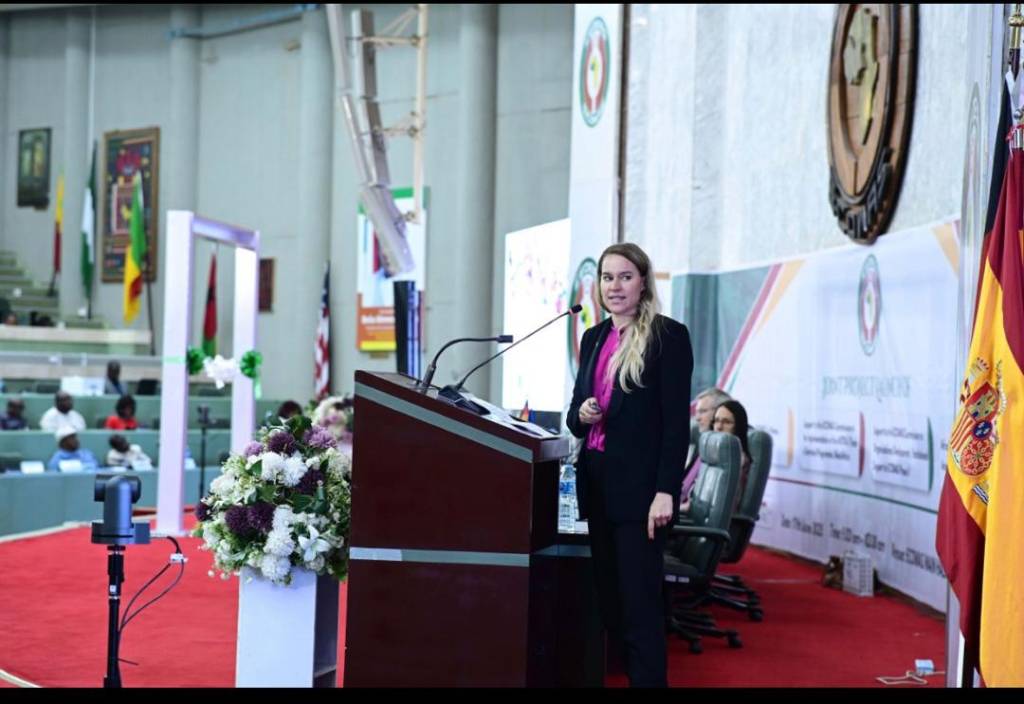
“GIZ Commits to Delivering Tangible Impact across ECOWAS” – Ms Ossmann
Ms. Svenja Ossmann, ECOWAS Cluster Coordinator and Head of Organizational Development (OD) Project at the Deutsche Gesellschaft für Internationale Zusammenarbeit (GIZ) GmbH i.e. the German Development Cooperation, underscored the organization’s long-standing partnership with ECOWAS, noting that the newly launched projects are under the unified Team Europe approach.
Ms Ossmann said for the first time, all related initiatives across GIZ’s portfolio are converging in a harmonized path to deliver greater regional impact. “For the past ten years, we were working in separate lanes. And now, for the first time across the whole portfolio, we managed to embrace a European joint path. We are proud, on behalf of the German government and alongside the EU, Spain, and France, to support the ECOWAS Commission in delivering tangible results that matter to the people in the region.”
The GIZ Project Head said the EPSG program builds on the previous ECOWAS Peace and Security Architecture and Operations (EPSAO) program with expanded focus including deeper engagement with Member States. “By 2027, we aim to see improved infrastructure for regional training and tangible results at member-state level. GIZ expects the EPSG program to yield a stronger regional conflict prevention mechanism, more democratic and results-based security sector reforms, and a reinforced focus on women and youth.”
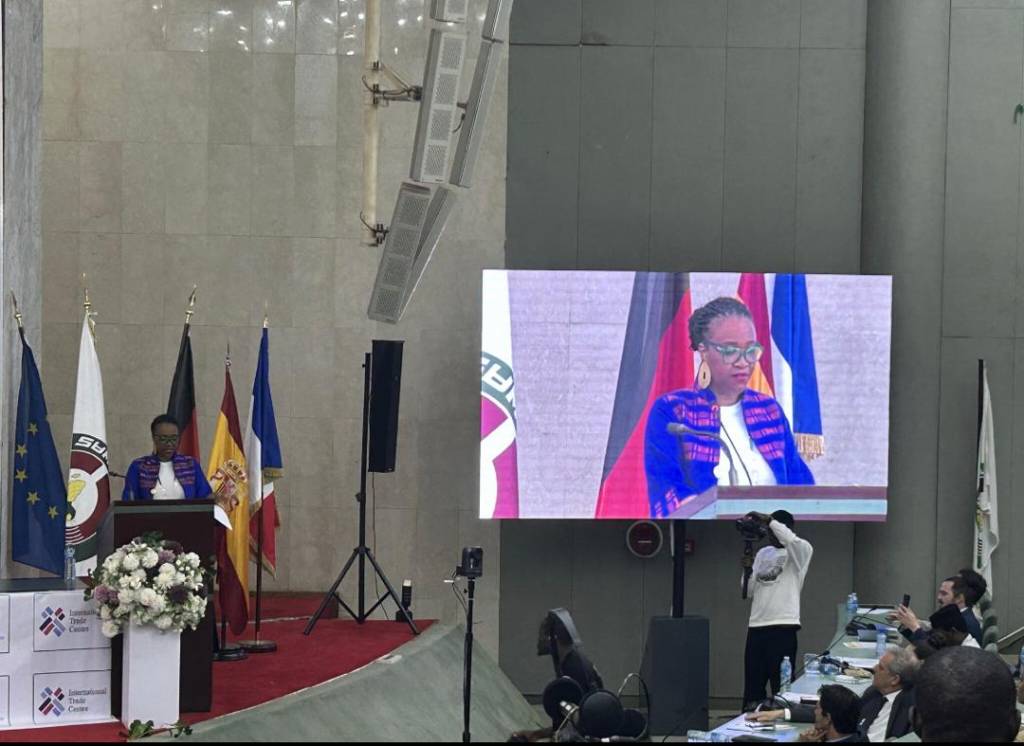
“ATCMA to Enhance West African SMEs’ Competitiveness” – Aissatou Diallo
Ms. Aissatou Diallo, Chief of the International Trade Centre’s Office for Africa, described the recent ECOWAS 50th anniversary milestone as a testament to the regional block’s tireless commitment to regional integration, peace, stability, and economic development in West Africa. She underscored the significance of the Africa Trade Competitiveness and Market Access (ATCMA) project—one of the largest initiatives under the EU’s regional cooperation strategy—with a total budget of €200 million, of which ECOWAS gets €50 million.
“At the ITC, we are proud to have shared in this journey. Our partnership with ECOWAS has been built on mutual trust, a shared vision, and concrete action. From boosting trade competitiveness to advancing inclusive value chains, we have achieved significant milestones together through programmes such as the West Africa Competitiveness Programme (WACOMP) which have laid the groundwork for deeper regional integration,” she noted.
Ms Diallo described the ATCMA program as a roadmap for resilience, opportunity, and transformation, anchored not only in the ECOWAS’s Vision 2050 and the AfCFTA but also aligned with the EU-AU joint Vision 2030. “Most importantly, it is grounded in the aspirations of ECOWAS citizens to unlock the region’s full trade potential, boost intra-regional trade flows, and take on a more prominent role on the implementation of the AFCFTA.”
She noted that ATCMA will enhance West African SMEs’ competitiveness through capacity building and climate-responsive industrial partnerships. “We are committed to delivering impact-oriented interventions with fewer workshops and more direct collaboration with beneficiaries. As the [ECOWAS] President rightly stated, it is time to deliver to the people, for the people. ATCMA is not just another technical program; It’s a bold leap forward, driven by scale, ambition, and genuine partnership. We are ready to deliver.”
“There are Strong Linkages between ECOWAS Vision 2050 and the EU Global Gateway”
Similarly, Mr. Bernard Bau, Head of the Competitiveness, Quality and Compliance Unit at the United Nations Industrial Organisation (UNIDO) described the ATCMA program as a novel and Pan African program that builds on the joint conviction that industrial development and trade are interlinked powerful engines for creating prosperity. He also underscored the strong linkages of the ECOWAS Vision 2050 and the EU Global Gateway with the Green Deal.
“Responsiveness to climate change, employment creation, in particular for youth, sustainable management of environmental resources, are common denominators of both the AU, the EU, and their respective member states, and reflect the aspirations of their populations and the generations to come. Such sustainable development therefore needs long-term partnerships for economic development, combined with social and environmental goals, based on mutual understanding and objectives,” said Mr Bau.
Mr Bau said the ECOWAS component of the ATCMA program would create a level playing field for West African SMEs. “Industrial development and investment partnerships have such a long-term perspective and therefore are particularly well suited. They can well facilitate the transfer of green, clean, resource efficient technologies in support to the development of value chains, which in turn will create more local value addition, more competitive SMEs in local, regional and international markets, and ultimately create sustainable employment.”
As ECOWAS and its partners begin implementing the four joint projects, the call by President Touray to “deliver concrete results for the people of West Africa” will continue to resonate among project implementers and stakeholders. The true measure of success will not lie merely in the number of workshops, trainings, or validation meetings, but in the tangible impacts and lasting legacies these initiatives leave on the region’s peace, trade, and development landscape. The focus must remain on real outcomes that improve lives and strengthen West Africa’s future.

